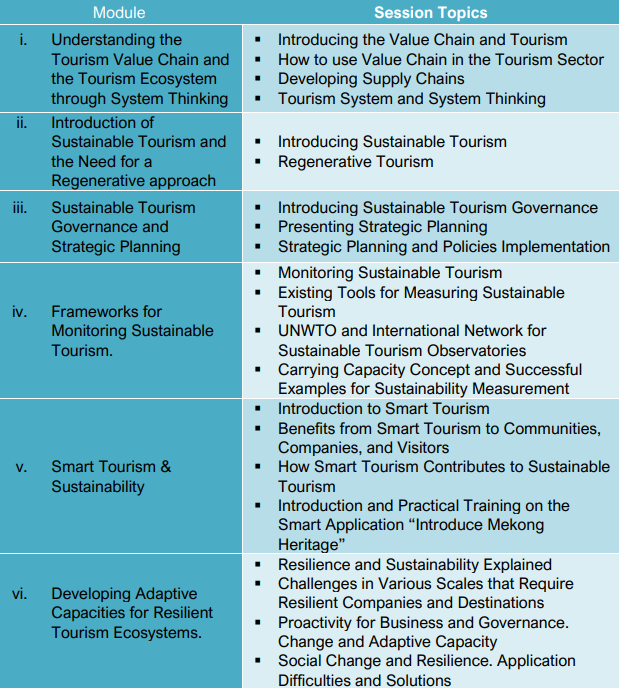
The Mekong region is among the world’s most visited travel destinations, having welcomed more than 70 million tourists in 2018 alone. As the tourism industries of Cambodia, Lao PDR, Myanmar, Thailand, and Vietnam are helping promote economic growth, generate employment, and foster peaceful societies, their governments are increasing efforts to pursue a more balanced, collaborative, and sustainable tourism development.
The Mekong Institute (MI) is implementing a three-year project on “Sustainable and Smart Tourism Development in the Mekong Region”, funded by the Republic of Korea through the Mekong – Republic of Korea Cooperation Fund (MKCF). The long-term objective of the project is to promote human resource development to manage the growing inbound tourism market through the adoption of sustainable and smart tourism practices in the Mekong countries namely Cambodia, Lao PDR, Myanmar, Thailand, and Vietnam. The short-term objectives of the project are to enhance capacities of the tourism related organizations in government, private sector and academe to promote sustainable tourism practices through new tools and techniques on smart tourism, exchanges and visits, information sharing and adoption of best practices.
As part of the project, the training curriculum package is designed and developed to support the creation of “smart tourism cities and destinations” and to strengthen the five Mekong countries’ capacities to become more competitive in global tourism market. The package introduces important areas of cutting-edge knowledge about sustainable tourism and digital transformation introducing important aspects like monitoring sustainability and gaining resilience.
- To introduce the utilization of the training curriculum package tools and techniques on the training curriculum package;
- To support capacity building and tailored training for the participating individuals, companies, or organizations.
- To deliver the training modules contents based on the curriculum developed to support the direct and indirect project’s stakeholders for further capacity building activities at their organization, association and training center;
- To transfer the training curriculum package to prospective stakeholders in Mekong region for further utilization in their organization, association and training center.
At the end of the meeting, the stakeholders should have acquired knowledge and practical skills on a variety of pertinent topics. They will have a clear deeper understanding of the significance of “Sustainable and Smart Tourism” and sustainable practices in the tourism industry contributing to the results on
- Higher quality hospitality and tourism services in Mekong countries
- Increased tourism competitiveness among Mekong countries due to the wide and efficient utilization of smart technologies.
Moreover, this meeting will aim to achieve the following outcomes:
- Enhanced the stakeholder’s knowledge on topics in sustainable and smart tourism development.
- Enhanced capacities of national ministries and tourism associations on sustainable and smart tourism development process.
- Improved mechanism to share and promote collective action on sustainable and smart tourism development in Mekong region.
- Improved information on access to sustainable and smart tourism development.
The target group of the training curriculum package dissemination are the project’s stakeholders and beneficiaries in Mekong region from tourism promotion agencies, tour and travel organizations/operators, tourism enterprises (Hotels, Restaurants, Entertainment centres, Souvenir shops, Local crafts, and etc.), Creative artists/performers, Worldwide Travelers, Investors, Tour guides, Tourism media/ social media influencers, Universities/hospitality education, and Training centres.
The training curriculum contents combine the most recent theoretical and practical approaches for sustainable and smart tourism, highlighting a holistic approach to various important aspects and fundamental values. Seeking to introduce an efficient pathway towards sustainable and digital transition in tourism, the training curriculum focus on sociocultural, environmental, and economic pillars in an innovative and meaningful way to inspire those engaged in the training sessions.
The training curriculum package includes outline; curriculum design statement; module review (learning objectives, overview, detailed session and sub-session topics outline); daily session plan (in-class activities and delivery methods, materials to be used for each session, time allocation and leading facilitator / presenter);session content (overview of each session and session materials); guidance for classroom activities and other interaction activities to motivate the participants to learn the knowledge and skills.
The training curriculum package consists of six interrelated modules on

The interested stakeholders in taking / be part of the training curriculum package are requested to submit the following docs for further discussion and dissemination.
- Official letter with objective(s) and channel on utilizing the training curriculum package e.g training, workshop, meeting, to the Director of Trade and Investment Facilitation Department as the Project Team Leader;
- A Partnership Agreement on the Training Curriculum Package Usage will be processed for both parties (Mekong Institute and Interested Partner) as a reference document.
- All of the training curriculum package contents, both in original in English and Translated in local language version are a MUST to credit name of Mekong Institute and support by MKCF. If any contents are translated into local language, the user is necessary to bear the cost.
- Mekong Institute’s team will follow up the training curriculum package utilization after 3 months upon the agreement.
For details, please contact the MKCF’s Project Implementing Team
Mr. Madhurjya Kumar Dutta (Director) Trade and Investment Facilitation Department and Mekong-Korea Cooperation Fund (MKCF)
Mekong Institute
(Inter-Governmental Organization of the Greater Mekong Sub- region countries) Khon Kaen | Thailand- 40002
Tel: +66 4320 2411 ext. 2101
Mobile: +66 (0) 87 492 7118
Email: [email protected]
Mr. Sa-nga Sattanun (Program Manager) Trade and Investment Facilitation Department
Mekong Institute
(Inter-Governmental Organization of the Greater Mekong Sub- region countries) Khon Kaen | Thailand- 40002
Tel: +66 4320 2411 ext. 2102
Mobile: +66 (0) 87 858 2628
Email: [email protected]
To download the agenda, click here


